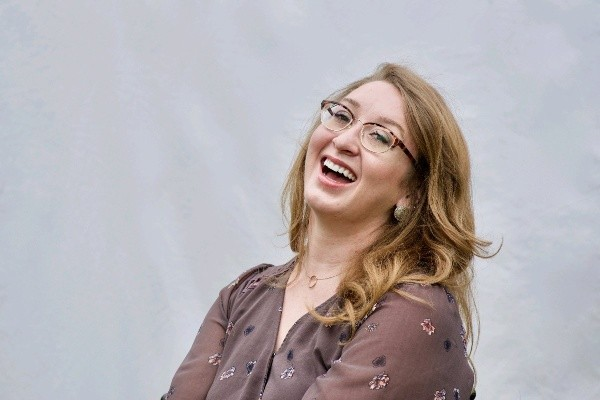Designing Safe Spaces to Explore Sexuality
Kathryn Ewers is an Individual and Relational therapist trained as a marriage and family therapist (MFT) with a specialization in sex therapy. Her practice is based out of Philidelphia and focuses on helping people unlearn the things that aren’t working for them in life. Her goal is to create safe, warm, comfortable spaces for people to feel heard in a world that oppresses us.
MSB: What inspired you to get into this line of work?
KDE: I attended Thomas Jefferson University in Philadelphia, PA, the only MFT program with a sex therapy track. My personal experiences ultimately led me to the field of mental health, from familial mental health to experiencing child sexual abuse. I received my bachelor's in psychology from the University of North Dakota and worked at an inpatient psychiatric hospital for three years before moving on to support individuals with developmental, intellectual and physical disabilities. At the same time, I was working to facilitate male offender groups, which I’d come to the MFT program in hopes of doing. This changed as I became more involved in trauma work and working with sexual assault survivors and victims. I have always wanted to support individuals in a system that does not support their sexual health (mentally and physically).
MSB: What is the most common misconception people seem to have in regards to reproductive health?
KDE: There are several misconceptions when it comes to reproductive health. From my experience, the most common I have seen is folks believe their reproductive health only matters if they want to reproduce. (This is wrong!)
MSB: How is our reproductive health tied to our sexual selves and our sexuality?
KDE: Our reproductive health ties to our sexuality in so many ways. Understanding our reproductive organs helps us become familiar with our bodies, wants, needs and desires. Knowing how our hormones fluctuate or simply knowing their levels helps us to regulate our moods, our sleep, our appetite, our level of desire (when we are more turned on/off). It provides a base for being sexually autonomous human beings. Knowing our body and how it works and how it is functioning for us allows individuals to create boundaries and communicate those boundaries to others (since boundaries are subjective and unique, knowing what your body craves, dislikes, and needs helps with regulating helps form those boundaries). Reproductive health is not just going to a doctor and getting pap smears and prostate exams; it is knowing your body inside and out, how it feels, how it works, how it secretes, how it moves. It's truly amazing.
MSB: What are your first thoughts when it comes to light and sexuality? What do you think of first?
KDE: My first thoughts are vulnerability. When I was younger, I saw a lot of folks say to turn the lights off. I questioned that a lot and did just that until I got older! Light and sexuality, to me, are shining a light on your most vulnerable parts. Your worries...your insecurities...your curves...your hair...your needs...your wants...your desires...and fantasies. When I think of light and sexuality, I think of space to heal, space to be your true sexual self.
MSB: How do you see mental health tied to sexuality?
KDE: Mental health and sexuality is still a highly stigmatized area (even if folks deny it). When it comes to sexuality and mental health in my work, one impacts the other. Nonfunctional mental health (such as anxiety or depression) can lower one's sexual drive, increase anxiety when engaging in a sexual experience, and affect one's sense of self. Also, a lack of proper sexual education creates a lot of shame. Shame is one of the most common core emotions I support individuals in healing. Our system is not set up to support folks outside of the flawed binary. So we have sex therapists. We work with folks to rewrite that narrative of shame. We support them in overcoming their sexual anxieties and validate their experiences. We provide a space of compassion and acceptance. Just as we would with someone suffering from grief or depression.
MSB: Can you speak a little about sex with/without the lights on? Why do people choose one or the other? Are those reasons healthy?
KDE: Most folks see sex portrayed for the first time in movies or porn. Typically in movies, there is dim lighting or low lights; the mood is set. In a lot of porn, there are bright lights (it's a production). Folks can become intimidated and internalize those setups. For example, people will feel they can never be like the porn stars (so I have to hide because I am not good enough). This is a complex answer to the question because it is about preference. Some folks love lights on; they love to see it all (their partners’ reactions or bodies). Some folks want the lights off (it sets the mood, or they may feel insecure and too vulnerable). Or they simply copy what they have seen because that is all they know. That is an issue with sex education not being standardized. It’s lead to disorganization in folks, thus promoting disorganization in their sexual lives at times.
I am not keen on the word "healthy," especially when it comes to sexuality. I prefer functional (working) and nonfunctional (not working); this is subjective to each individual. If turning the lights off is causing someone distress, it's non-functional. If having the lights on is causing someone distress that is nonfunctional and sex therapists and other sexuality professionals can support those folks in rewriting that nonfunctional narrative to a functional one.



